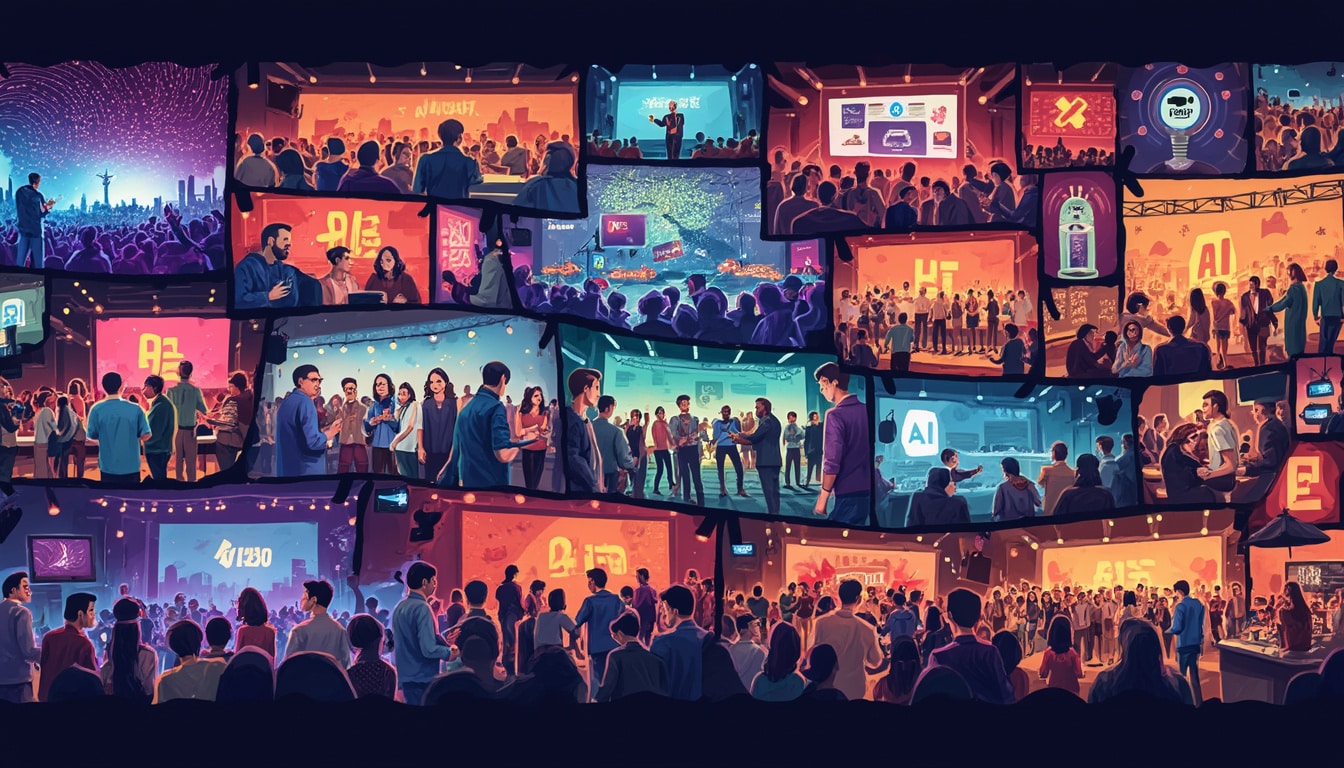As a Community Manager, I turn ideas into vibrant communities.
Every interaction is an opportunity to strengthen bonds and engage authentically.
With creativity and strategy, I energize your online presence.
My mission is to create spaces where your clients feel heard and valued.
Through captivating content and personalized interactions, I establish a trusting relationship.
Together, we cultivate a strong and engaging brand image.
Let’s explore the world of social media and grow your community.
Table of Contents
ToggleThe Latest Advertising Trends According to Ad Age
In the constantly evolving advertising landscape, Ad Age remains an indispensable source for tracking the latest trends and innovations. This article explores recent news regarding advertising, marketing, technology, and data, relying on the analyses and reports from Ad Age.
How Are Brands Using Content Curation to Engage Their Audience?
Content curation has become an essential strategy for brands seeking to engage their audience in an authentic and relevant way. According to a recent article from Ad Age, Coca-Cola has implemented an open and essential advertising campaign on the web through content curation. By carefully selecting articles, images, and videos that resonate with their target audience, Coca-Cola has managed to create a coherent and engaging online experience. This approach not only maintains consumer interest but also strengthens brand loyalty.
Content curation offers several advantages, including improved SEO by increasing time spent on the site and reducing bounce rates. Moreover, it allows brands to position themselves as thought leaders in their field by sharing relevant and high-quality information. For community managers, this strategy is an effective way to diversify content while remaining aligned with the brand’s values and objectives.
What Are the New Technological Advancements in Digital Marketing?
Digital marketing continues to evolve due to technological advancements. One of the major recent developments reported by Ad Age is the increased use of generative artificial intelligence (AI) by giants like Estée Lauder. By integrating Adobe’s solutions, Estée Lauder has been able to intensify the use of AI to create more personalized and engaging advertising campaigns. This technology enables the generation of tailored content that meets the specific expectations of consumers, thereby improving the effectiveness of marketing campaigns.
Furthermore, data analysis tools are becoming increasingly sophisticated, providing marketers with precise insights into consumer behavior. These tools allow for further audience segmentation and create hyper-targeted messaging, thereby increasing the return on investment for advertising campaigns. The integration of AI and data analysis is a game changer, making digital marketing more precise and effective than ever before.
What Impact Does SEO Have on Small Businesses?
SEO plays a crucial role in the online visibility of small businesses. An article from Ad Age highlights the transformative impact of SEO on these businesses, moving from invisibility to irresistibility. By optimizing their website for search engines, small businesses can attract high-quality organic traffic without having to invest heavily in paid advertising. This approach is particularly beneficial for local businesses looking to attract customers in their area.
SEO is not just about keywords. It also encompasses the technical optimization of the site, the creation of quality content, and the acquisition of relevant backlinks. By focusing on these aspects, small businesses can improve their rankings in search results and increase their online visibility. Moreover, good SEO can lead to a better user experience, which is essential for retaining customers and encouraging conversions.
How Do Data Influence Advertising Strategies?
Data is at the heart of modern advertising strategies. Ad Age reports that the use of data allows brands to better understand their audience and create more effective campaigns. By analyzing consumer behaviors, brands can identify trends and preferences, enabling them to tailor their advertising messages more specifically. This personalization not only increases consumer engagement but also boosts conversion rates.
Additionally, data allows for precise measurement of advertising campaign performance. Brands can track key performance indicators like cost per click, conversion rates, and return on investment. This information is essential for adjusting and optimizing campaigns in real time, ensuring effective use of advertising budget. Ultimately, the integration of data into advertising strategies enables brands to make evidence-based decisions, thus enhancing their overall results.
What Are the Current Challenges in Digital Marketing?
Digital marketing faces several challenges as the landscape evolves. According to an Ad Age report, one of the main challenges is the saturation of communication channels. With an increasing number of brands seeking to stand out on the same platforms, it is becoming increasingly difficult to capture and retain consumer attention. To overcome this challenge, brands must adopt innovative and differentiated strategies, such as creating interactive content or using new technologies like augmented reality.
Another major challenge is data protection and consumer privacy. With the introduction of strict regulations like GDPR, brands must navigate a complex environment to ethically and legally collect and use consumer data. This requires increased transparency and rigorous data management, which can be a constraint for some businesses. However, those who succeed in building a trusting relationship with their consumers regarding data management can gain a significant competitive advantage.
What Are the New Technological Tools Revolutionizing Advertising?
The advertising industry is benefiting from the emergence of many innovative technological tools. A notable example reported by Ad Age is Digital Nodle, which empowers local businesses in London through expanded SEO and paid advertising services. These tools allow businesses to better target their audiences, automate advertising processes, and measure campaign performance more precisely.
Advertising campaign management platforms like Google Ads and Facebook Ads continue to evolve, offering advanced features like AI-based automation and even more granular targeting capabilities. Moreover, emerging technologies like blockchain are being explored to improve advertising transaction transparency and security. These technological tools enable marketers to create more effective campaigns and maximize their return on investment.
How Is AI Transforming the Advertising Landscape?
Artificial intelligence (AI) is significantly transforming the advertising landscape. Estée Lauder, for instance, has intensified its use of generative AI through integration with Adobe, as reported by Ad Age. AI enables the creation of personalized advertising content on an unprecedented scale by analyzing consumer data to generate messages tailored to their specific preferences. This not only enhances user engagement but also optimizes advertising campaign effectiveness.
Additionally, AI is used for real-time bidding optimization, audience segmentation, and predictive analysis. These applications allow marketers to anticipate consumer behaviors and respond quickly to market changes. AI also facilitates the automation of repetitive tasks, freeing up time for marketing teams to focus on more strategic initiatives. In summary, AI is a major catalyst for innovation and efficiency in the advertising field.
What Impacts Do Social Media Have on Marketing Strategies?
Social media plays a crucial role in contemporary marketing strategies. Ad Age highlights that platforms like Instagram, TikTok, and LinkedIn offer unique opportunities to reach and engage diverse audiences. Brands use these platforms to create visually appealing content, interact directly with consumers, and creatively promote their products or services.
Social media also allows for advanced audience segmentation, giving marketers the opportunity to target specific groups based on demographic, behavioral, or interest criteria. Furthermore, advanced advertising features, such as sponsored posts and interactive stories, allow for the creation of highly personalized and effective campaigns. By utilizing the data generated from social media interactions, brands can refine their marketing strategies and maximize their impact.
How to Measure the Effectiveness of Advertising Campaigns?
Measuring the effectiveness of advertising campaigns is crucial for optimizing marketing strategies. Ad Age highlights several key metrics used by marketers to evaluate their campaign performance. Among these, the click-through rate (CTR), the cost per acquisition (CPA), and the return on investment (ROI) are among the most important. These indicators quantify the impact of campaigns and determine whether the set objectives are achieved.
Moreover, advanced analytic tools allow for tracking user behavior after clicking on an ad, providing a comprehensive view of the customer journey. Platforms like Google Analytics provide detailed insights into conversions, traffic sources, and user interactions with the website. This data is essential for identifying strengths and areas for improvement in advertising campaigns. By using this information, marketers can adjust their strategies in real time to maximize effectiveness and return on their advertising investments.
What Roles Do Data Play in Personalizing Marketing Campaigns?
Data play a central role in the personalization of marketing campaigns. Ad Age emphasizes that data analysis allows brands to better understand consumer preferences and behaviors. By utilizing demographic, behavioral, and transactional data, marketers can create precise audience segments and develop highly personalized advertising messages. This personalization not only increases consumer engagement but also improves conversion rates.
Marketing automation platforms, such as HubSpot and Marketo, facilitate data collection and analysis, enabling marketing teams to deploy personalized campaigns at scale. Furthermore, machine learning and AI technologies enable predictions of consumer needs and adaptation of campaigns accordingly. Ultimately, smart use of data allows brands to create more relevant and effective marketing experiences, thereby strengthening their relationship with customers.
How Can Local Businesses Benefit from Advanced SEO Strategies?
Local businesses can greatly benefit from advanced SEO strategies. Digital Nodle, as mentioned in an Ad Age article, offers expanded SEO and paid advertising services to strengthen local businesses in London. By optimizing their online presence, these businesses can attract more customers in their area, improve their visibility on search engines, and stand out from the competition.
SEO strategies for local businesses include optimizing Google My Business listings, creating localized content, and obtaining backlinks from relevant local sources. Moreover, using region-specific keywords allows for capturing more targeted traffic and generating qualified leads. By adopting these strategies, local businesses can not only increase their online visibility but also strengthen their reputation and credibility in their community.
What Are Recent Innovations in Paid Advertising?
Paid advertising continues to evolve with numerous technological innovations. Ad Age reports that Digital Nodle’s expanded services now include advanced features for managing paid advertising campaigns. These innovations include bid automation, AI-based targeting, and integration with other marketing platforms. These tools enable marketers to create more precise and effective campaigns while optimizing their advertising budget.
Additionally, interactive ad formats, such as augmented reality ads and immersive videos, are gaining popularity. These formats provide more engaging experiences for users, thereby increasing their interaction with ads and improving conversion rates. Furthermore, advertising platforms are increasingly integrating real-time tracking features, allowing marketers to measure the impact of their campaigns more accurately and adjust their strategies accordingly.
What Future for Artificial Intelligence in Marketing?
The future of artificial intelligence (AI) in marketing looks promising, with ongoing innovations pushing the boundaries of what is possible. Ad Age emphasizes that the integration of AI into marketing strategies allows for creating more personalized and engaging user experiences. AI not only facilitates the automation of repetitive tasks but also offers advanced analytical capabilities to better understand consumer behaviors and anticipate their needs.
In the future, AI could play an even more central role in developing real-time marketing campaigns, adapting advertising messages based on users’ instant interactions. Additionally, generative AI technologies could enable the creation of fully personalized advertising content tailored to each individual. This shift toward greater personalization could transform how brands interact with their customers, making marketing campaigns more effective and relevant.
How Are Current Trends Shaping the Future of Digital Marketing?
Current trends in advertising, marketing, technology, and data are profoundly and durably shaping the future of digital marketing. Ad Age highlights that elements such as advanced personalization, AI integration, and the growing importance of SEO continue to redefine marketing strategies. Brands that adopt these trends can not only remain competitive but also create more enriching and effective customer experiences.
Furthermore, the rise of social platforms and immersive technologies opens new avenues for marketers, allowing for more dynamic and engaging interactions with consumers. The continued emphasis on data protection and privacy is also shaping marketing practices, forcing brands to be more transparent and ethical in their use of user information. By embracing these trends, digital marketing is evolving towards a future where innovation, personalization, and accountability are at the heart of successful strategies.
The news on advertising, marketing, technology, and data as reported by Ad Age reflects an industry in full transformation. Brands must adopt innovative strategies, rely on data, and integrate new technologies to stay competitive. By following these trends and adapting to market evolutions, businesses can create more effective, engaging, and successful campaigns.











